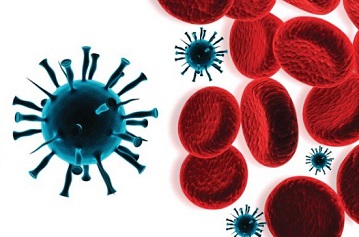BREAKING NEWS! Belgium Study Finds That COVID-19 Can Cause Erythropoiesis Alterations, Inflammatory Anemia And Prevalence Of Positive Coombs Tests!
Nikhil Prasad Fact checked by:Thailand Medical News Team Oct 01, 2023 2 years, 4 months, 1 week, 4 days, 1 hour, 48 minutes ago
COVID-19 News: The COVID-19 pandemic has disrupted healthcare systems worldwide for over two years. In addition to the well-documented respiratory symptoms, the virus has presented a bewildering array of atypical manifestations, including frostbites, acrosyndromes, and autoimmune anemias, some of which involve cold agglutinins. A recent study conducted at the University Hospital of Liège in Belgium and the University of Liège-Belgium has delved into these complexities, shedding light on the impact of COVID-19 on erythropoiesis, the prevalence of positive Coombs tests, and the virus's influence on iron metabolism.

This
COVID-19 News report explores the findings of this groundbreaking study, offering valuable insights into the multifaceted nature of COVID-19 and its implications for clinical practice.
The study aimed to investigate the prevalence of positive direct Coombs tests (DCTs) and hemolytic autoimmune anemia, particularly cold agglutinin anemia, among COVID-19 patients. Additionally, it sought to determine the correlation between positive DCT status, anemia, and the occurrence of complications, as well as to study the effects of the virus on iron metabolism and its potential associations with clinical outcomes.
Positive Coombs Tests and Anemia
The study, conducted as an observational, cross-sectional, single-center, exploratory research, involved a population of 179 COVID-19-infected patients at the CHU of Liège.
The study team observed a noteworthy 20.3% prevalence of positive DCT among these patients, with IgG being the primary immunoglobulin subtype identified in 91.7% of the positive cases.
Intriguingly, the positive DCT patients not only exhibited a higher degree of anemia but also required more transfusions. Moreover, they were more likely to be transferred to intensive care units (ICUs) and had longer hospital stays and mechanical ventilation periods.
The pattern of anemia observed in the positive DCT patients was consistent with inflammatory anemia, as indicated by elevated levels of hepcidin and ferritin.
Notably, erythropoietin (EPO) and erythroferrone values were lower than expected for the severity of anemia in these patients, suggesting a significant impact of the virus on erythropoiesis.
Furthermore, the study identified a correlation between iron parameters and the severity of COVID-19 infection, underscoring the complex interplay between the virus, inflammation, and iron metabolism.
Understanding the Implications
The study's findings provide valuable insights into the impact of COVID-19 on erythropoiesis and iron metabolism. The prevalence of positive DCTs, although not indicative of autoimmune hemolysis, was associated with more severe forms of COVID-19 infection. These discoveries have important implications for clinical practice, highlighting the need for healthcare providers to monitor anemia and
iron status in COVID-19 patients, particularly those with positive DCT results. Recognizing the presence of inflammatory anemia and its correlation with disease severity could aid in more targeted and effective management strategies for COVID-19 patients.
Cold Agglutinin Hemolytic Anemia and COVID-19
Initially, the study was prompted by the discovery of two cases of cold agglutinin hemolytic anemia in COVID-19 patients during the first wave of the pandemic. Cold agglutinin hemolytic anemia is an autoimmune disorder characterized by autoantibodies, typically of the IgM isotype, that become active at low temperatures (0°C-4°C) and agglutinate red blood cells. This leads to complement activation and extravascular hemolysis, primarily in the liver. While these cases were intriguing, subsequent research did not find a widespread correlation between COVID-19 and cold agglutinin hemolysis. Instead, the study revealed a higher prevalence of positive DCTs and inflammatory anemia in COVID-19 patients, which suggests a different mechanism at play.
Understanding Inflammation and Iron Metabolism
Inflammation is a well-established cause of anemia, and it significantly affects iron metabolism. During inflammation, interleukin-6 (IL-6) promotes the synthesis of hepcidin, a key regulator of iron metabolism. Hepcidin binds to ferroportin on various cells, including enterocytes, macrophages, and hepatocytes, leading to its degradation and inhibiting the release of iron into the bloodstream. This disruption in iron homeostasis can contribute to anemia, especially in the presence of chronic inflammation.
Additionally, erythroferrone, a recently identified protein produced by erythroblasts, plays a crucial role in iron metabolism. Erythroferrone inhibits hepcidin synthesis, ensuring that more iron is available for erythropoiesis. In COVID-19 patients, elevated hepcidin and ferritin levels and reduced EPO and erythroferrone levels were observed, suggesting a functional iron deficiency and disrupted erythropoiesis driven by inflammation.
Implications for Clinical Practice
The study's findings emphasize the complexity of COVID-19 and its impact on the hematological system. Healthcare providers should be aware of the potential for inflammatory anemia in COVID-19 patients, particularly those with positive DCT results. Monitoring iron parameters and anemia in these patients is essential, as it can provide valuable insights into disease severity and guide treatment decisions. Further research and long-term studies in larger populations are needed to corroborate these findings and integrate them into clinical practice.
Conclusion
The COVID-19 pandemic has posed numerous challenges to the medical community, revealing the virus's ability to manifest in diverse and unexpected ways. The Belgium study conducted at the University Hospital of Liège sheds light on the complex relationship between COVID-19, erythropoiesis, and iron metabolism. While the study did not find a widespread correlation between COVID-19 and cold agglutinin hemolytic anemia, it did uncover a significant prevalence of positive DCTs and inflammatory anemia in COVID-19 patients.
These study findings underscore the importance of monitoring anemia and iron parameters in COVID-19 patients, particularly those with positive DCT results. Recognizing the presence of inflammatory anemia and understanding its implications for disease severity can inform more targeted and effective treatment strategies. Further research and long-term studies are needed to validate these findings and translate them into clinical practice, ultimately improving the care of COVID-19 patients worldwide.
The study findings were published in the peer reviewed journal: Therapeutic Advances In Hematology (Sage Journals).
https://journals.sagepub.com/doi/full/10.1177/20406207231199837
For the latest
COVID-19 News, keep on logging to Thailand Medical News.
